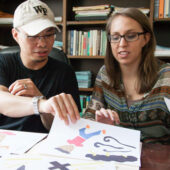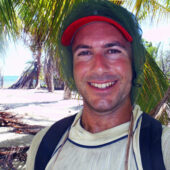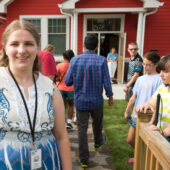Hunger, not a game
 Rather than putting a Band-Aid on a wound, Wake Forest students, faculty and staff continue to take a proactive approach in preventing and eradicating hunger and bringing about systemic change.
Rather than putting a Band-Aid on a wound, Wake Forest students, faculty and staff continue to take a proactive approach in preventing and eradicating hunger and bringing about systemic change.
Categories: Campus Life, Community Impact, Environment & Sustainability, Experiential Learning, Pro Humanitate

 Stand in the courtyard between Wake Forest’s Dogwood and Magnolia Halls and look south. The view of the iconic Wait Chapel, framed on either side by the recently completed buildings, is jaw-dropping. The mirror image Dogwood and Magnolia are the newest residence halls on campus.
Stand in the courtyard between Wake Forest’s Dogwood and Magnolia Halls and look south. The view of the iconic Wait Chapel, framed on either side by the recently completed buildings, is jaw-dropping. The mirror image Dogwood and Magnolia are the newest residence halls on campus. “It was a dark and stormy night.” This is how Janna Raley started her mathematical economics paper. Surprised? So was her professor. But, writing the assignment in the form of a children’s book led to an article published in an academic journal.
“It was a dark and stormy night.” This is how Janna Raley started her mathematical economics paper. Surprised? So was her professor. But, writing the assignment in the form of a children’s book led to an article published in an academic journal. Senior Lizzie Woods spent 10 weeks researching 20th century censorship and the Hollywood Production Code. Originally interested in book censorship, Woods found herself intrigued by the film and soon learned that during the 1930s, film censorship was getting stricter while books were more becoming more obscene.
Senior Lizzie Woods spent 10 weeks researching 20th century censorship and the Hollywood Production Code. Originally interested in book censorship, Woods found herself intrigued by the film and soon learned that during the 1930s, film censorship was getting stricter while books were more becoming more obscene.
 The amphibious mangrove rivulus is an extraordinary fish. It can survive out of the water for up to 66 days. Ph.D. student Benjamin Perlman is shedding new light on how the 3-inch rivulus moves across the ground once it gets there.
The amphibious mangrove rivulus is an extraordinary fish. It can survive out of the water for up to 66 days. Ph.D. student Benjamin Perlman is shedding new light on how the 3-inch rivulus moves across the ground once it gets there.
 This summer, junior Alex Buchholz lived in Azerbaijan and studied the relationship of energy and political outcomes in Central Asia. His research focused on the political ‘game’ newly independent states, Russia, and the United States have played over the control of oil and gas reserves.
This summer, junior Alex Buchholz lived in Azerbaijan and studied the relationship of energy and political outcomes in Central Asia. His research focused on the political ‘game’ newly independent states, Russia, and the United States have played over the control of oil and gas reserves. Senior Brian Shoemaker is helping a national team of scientists answer a million-dollar question: Could a substance that resembles baby powder curb global carbon emissions?
Senior Brian Shoemaker is helping a national team of scientists answer a million-dollar question: Could a substance that resembles baby powder curb global carbon emissions? Since early June, senior history major Leah Schenkel has been working with blind and visually impaired children at A Brighter Path Foundation’s Summer Enrichment Experience camp as one of 16 interns in the 2013 Summer Nonprofit Immersion Program, which is run by Wake Forest's Institute for Public Engagement.
Since early June, senior history major Leah Schenkel has been working with blind and visually impaired children at A Brighter Path Foundation’s Summer Enrichment Experience camp as one of 16 interns in the 2013 Summer Nonprofit Immersion Program, which is run by Wake Forest's Institute for Public Engagement. “I’m only 10 days into this program, but I already know I’m making friends for life,” Simone Watson (MA ’14) said. “The students and faculty here are incredibly kind and supportive of each other.”
“I’m only 10 days into this program, but I already know I’m making friends for life,” Simone Watson (MA ’14) said. “The students and faculty here are incredibly kind and supportive of each other.”